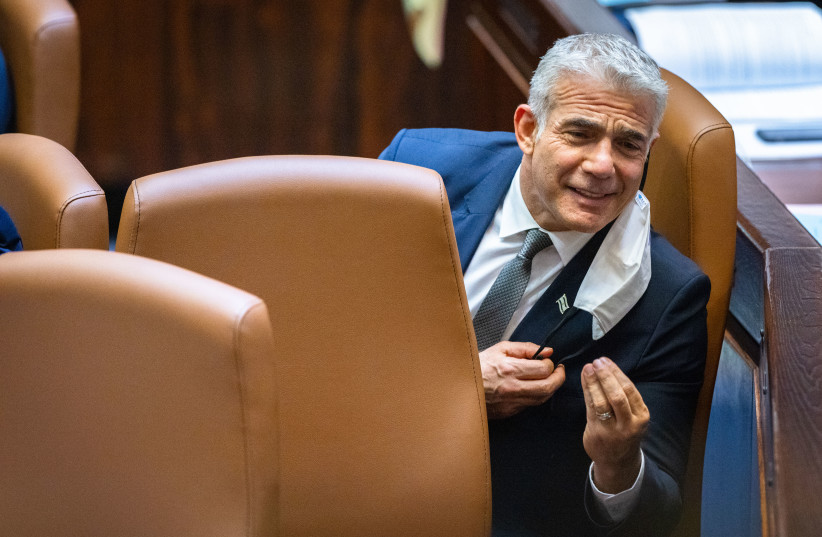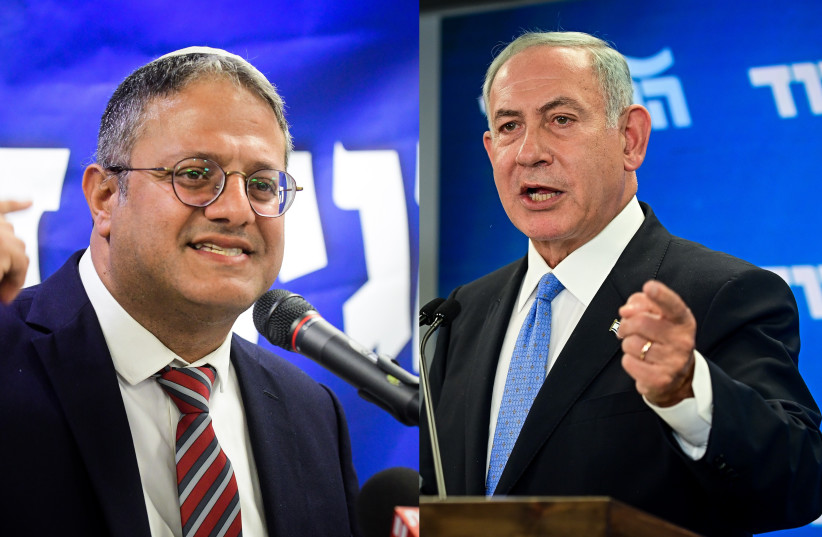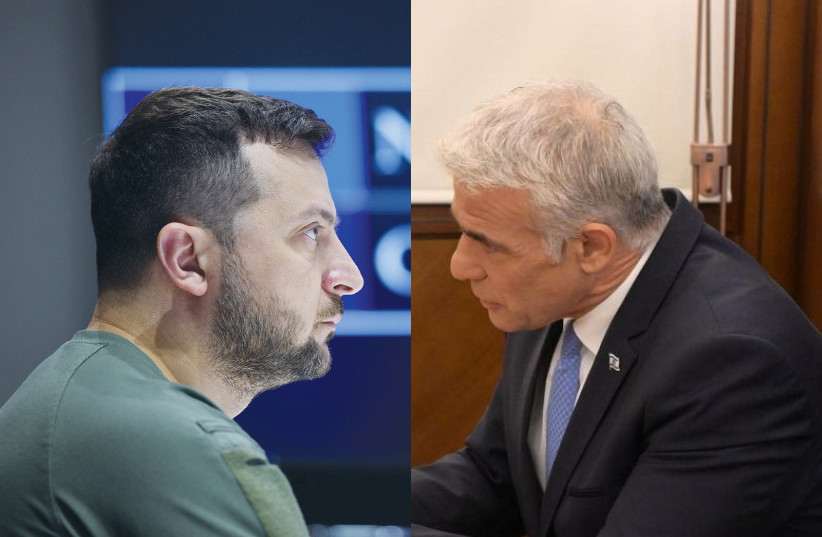Behind Prime Minister Yair Lapid’s large wooden desk in the Prime Minister’s Office in Jerusalem is a bookshelf with rows of books and a few photographs. There is his wife, Lihi; him with his children; his father, the former journalist and politician Tommy Lapid; and headshots of the two soldiers whose bodies are still being held by Hamas in the Gaza Strip – Oron Shaul and Hadar Goldin.
On the bottom shelf, directly behind him, are figurines of great Israeli leaders – Moshe Dayan, Golda Meir, David Ben-Gurion and others – from the “Piece of History” series.
And right next to them are two surprising framed photos – one of Ben-Gurion and the other of former premier Menachem Begin. Lapid forced them to sit together, even though the former disliked the latter so much he refused to call him by name.
We asked Lapid why he has photos of two of his predecessors who hailed from parties that are running against him today – Ben-Gurion from Labor and Begin from the Likud.
“Both of them, if they would be alive today, would be a part of Yesh Atid,” he explained, referring to the centrist party he founded 10 years ago.
“If Ben-Gurion were alive today, he wouldn’t be accepted in Labor, because he believed in a strong Israel based on our army....And if Begin were running [in the Likud] today, he would lose miserably because he believed in things like democracy, respect for the opposition, the courts, the rule of law. We are in the middle, and what we need right now is the ability to call upon everybody to move into the Center,” he added.

Yair Lapid - Israel's political center
THIS IS exactly what Lapid is trying to sell Israelis – the Center. He believes firmly that despite the far Right rising in countries such as Italy and Sweden and surging in the polls in Israel, now is exactly the time for centrism.
“We are living in extreme times, a post-COVID world, Ukraine, the energy crisis, inflation, the cost of living going up all over the world, and in periods like this, especially in the shorter term, you will always have a trend of people who claim to have simple solutions to very complicated problems,” Lapid told us this week. “It never works....Extremists are good at marching and shouting, but they’re not very good at running countries.
“I think centrism is going to triumph, because it’s the sensible way of running countries. People want their basic needs treated with something other than slogans and catchy phrases,” he said.
While Itamar Ben-Gvir concerns Lapid, he sees a different trend around the world that he hopes he will be able to ride to victory on Tuesday. Emmanuel Macron was recently reelected in France, Olaf Scholz won in Germany and Joe Biden won two years ago in the United States. Lapid hopes to soon join that list.
Still, Lapid said he is “very worried” about the rise of Ben-Gvir, the Religious Zionist Party MK and proponent of Rabbi Meir Kahane, who was banned from running for the Knesset on grounds of racist incitement.
“It’s always a new version of an old situation, in which there is a genuine problem, which creates a genuine fear, which creates movements that promise to solve your problem even though they have no idea how. Ben-Gvir is speaking about violence in the streets. There is violence... but there is no universe in which he is the solution,” Lapid said.
The prime minister called Ben-Gvir “a hoodlum who is endangering the police and the army, who is trying to create his own militias in the West Bank with the kind of people who just attacked the IDF paratrooper commander and his soldiers, and is running around with a gun in Sheikh Jarrah in the middle of the night endangering the lives of policemen who are trying to do their job.
“If you vote for Ben-Gvir, you are voting against the IDF and against our soldiers,” Lapid stated.
"If you vote for Ben-Gvir, you are voting against the IDF and against our soldiers"
Prime Minister Yair Lapid

Though the government that Lapid and his predecessor Naftali Bennett led, which spanned a broad ideological spectrum but excluded the pro-Netanyahu bloc, lasted only one year, Lapid argued that it was effective.
“This is a government of doers with a real ability and will to make change,” he said. “We doubled housing starts over the last year; we lowered the prices for 97 products, and are on our way to do more; we launched Operation Breaking Dawn and changed the equation in Gaza; we were a crucial part in stopping the dangerous deal with Iran; we reached a historic agreement with Lebanon, and we protected Israel democracy.”
The coalition fell apart because of “marginal Knesset members” who were bullied by the opposition, he said.
As such, the next coalition needs to be “better structured,” which Lapid said means “a much bigger Yesh Atid” that would give the government more “coherent leadership” than the small and medium parties of the current construction. He would not say whether the coalition would include Hadash-Ta’al, the more extreme of the two Arab lists with a chance at getting into the Knesset.
For Lapid, there is a clear difference between him and the bloc being led by the Likud’s Benjamin Netanyahu.
“We are going to protect Israeli democracy. Instead of attacking it, we’re going to protect the Supreme Court. We’re going to protect the LGBT community. We’re going to protect women’s rights and all the things that are now under attack,” he explained.
“We are going to keep on doing what we are doing, which is working very, very hard for the Israeli people. And this is the difference, because so many of the problems we’re facing today are because they were in power for 12 years and did nothing about things like cost of living. This is why it’s ridiculous to me that they’re saying they are going to solve this. You were there for 12 years and you did nothing.”
And there is another difference, he added. “They are talking about the past, and we are talking about the future. They’re talking about the government that is based on the hatreds of the past, the insults of the past and the agonies of the past. And what we are talking about is the country our children are going to live in.”
LAPID TOOK office on June 30 at midnight. Three hours later, at 3 a.m., his wife received a phone call from her brother who had been undergoing medical treatments in Los Angeles and was told that if she wants to bid farewell, now was the time. She left Israel the next day and her brother died five days later.
It was an emotional period for Lapid – on the one hand the loss of a brother-in-law to a severe illness, and on the other hand an entrance to the highest office in the country. There was very little time to bask in the moment. Two days later, on Saturday, Hezbollah flew three drones toward Israel’s Karish gas rig in the Mediterranean Sea. The aircraft were downed by the air force and navy missile systems.
Lapid decided to grab the issue of the maritime border by the reins and pushed through the final agreement this week, after approving it in the security cabinet and the full cabinet and not the Knesset, which the High Court of Justice permitted.
According to Lapid, the US-brokered agreement is historic, and opposition claims that he conceded far too much to a Hezbollah-controlled country or acted undemocratically by not bringing it to a Knesset vote are baseless.
“Everybody – from the cabinet, through the government to the Supreme Court – [approved it],” he said. “This agreement was based on a lot of intelligence reports that couldn’t be exposed to the general public, and I will not do so even though it might be useful in terms of campaigning. But I will say no one who has the facts is saying Hezbollah was behind this agreement. The fact that we have an agreement and the word “Israel” is written in it 20 times is a huge blow [to Hezbollah]. They were unhappy with it, but they don’t have a choice.... Lebanon needed this desperately, and therefore they did something they hadn’t done in years, which is bending Hezbollah’s arm.”
As for the timeline, Lapid said that it needed to be passed by the end of October because that is when Lebanese President Michel Aoun leaves office.
It is unclear who will replace him, and he and the other leaders of the country – the prime minister and parliament speaker – are barely on speaking terms, Lapid said. Time was of the essence.
“Since we felt this is the right thing to do for Israel security, the Israel economy, and Israeli policy, we were forced into the timetable. I knew that people were going to be suspicious about signing what I think is a historic agreement five days before the election, and therefore we let our justice system make the decision,” he said, referring to the Supreme Court rejecting petitions from right-wing organizations for an injunction against the deal.
ANOTHER TOPIC that has taken up a lot of Lapid’s time since he became prime minister has been Iran – its pursuit of a nuclear capability but also the world’s efforts to return to the 2015 Joint Comprehensive Plan of Action (JCPOA), commonly known as the Iran nuclear deal.
Lapid credited his and Bennett’s policy of greater, more positive engagement with the White House on the nuclear threat with part of the negotiations’ derailment.
“We succeeded in creating a dialogue with the Americans, first and foremost, but also with the Europeans, that was very open, sometimes to the verge of being blunt, yet it was respectful and truthful,” Lapid said. “There wasn’t a moment in which they suspected or hinted that they questioned the quality of the intelligence we were presenting, because they knew it’s an Israeli policy now to make sure that everything we are bringing to the table is truthful, whether or not it goes with the story we are telling.”
In addition, “they appreciated the fact that we were not playing games with American politics,” the prime minister said, a hint at Netanyahu who in 2015 flew to the US and gave a controversial speech before Congress against former US president Barack Obama’s efforts to finalize the JCPOA.
Once there was a positive dialogue, he said, the Americans were willing to listen to what Israel was saying about Iran, and they, too, realized that Tehran was lying about its nuclear program.
“So we had the right dialogue. And when we had the right dialogue, all of a sudden they were listening. And when they were listening, they were willing to look at the things we brought to the table. They realized that they’re being bluffed by the Iranians,” he said.
Lapid compared Iran’s obfuscation about its nuclear program to its statements about Iranian drones that Russia used against Ukraine.
“There are thousands of pictures of evidence and intelligence materials,” he said. “Ukrainians were just picking up Iranian drones from the ground in Ukraine. And the Iranians are saying: ‘No, we’re not sending drones to Russia.’ Lying and deceiving is the basic tool of Iranian policy.”
At the same time, Lapid warned against being too complacent about nuclear talks ending, saying they “didn’t evaporate completely.
“We do think and we are talking to our allies and friends about this... it’s time to start the discussion about the longer and stronger agreement that we all felt is the right agreement that we should have started the road with. This is what we’re telling everybody right now,” he said.
As for the major protests against the regime in Iran, Lapid said he has been cautious about making any public statements, to not allow Iran’s leadership to use that against the demonstrators.
“The strength of these protests is the fact that they are genuine and really grassroots protests, without us doing anything....I don’t want to harm one of the most truthful protests I have seen in the last decade, especially in Iran. These are young women mostly who are there for the principle of freedom. It’s not complicated. It’s just about the ability to have a life,” he stated.

Yair Lapid and the Ukraine-Russia War
AND THEN there is Ukraine, a situation that Lapid says is constantly evolving and needs to be assessed on a daily basis.
“The very dangerous closeness that is being created between Russia and Iran [is] not something we are going to ignore or do nothing about,” he said. “We are of course talking to the Americans about this. So what we need to do is reassess on a daily basis and react.”
We asked why, in that case, Israel continues to refuse to supply Ukraine with missile defense systems. The answer, he said, comes from a balance of two considerations.
“We are on Ukraine’s side. We are supporting them. We just voted at the UN [General Assembly] and tell the world that we will never accept the annexation of the four regions [of Ukraine by Russia]. We are still the only country in the world that built a field hospital in Ukraine,” he said.
At the same time, Lapid said, he is “making sure Israel’s national security interests are being protected at all times.”
Though Lapid did not specify, Israel’s policy of not providing Ukraine with weapons is, in part, due to a deconfliction mechanism between Jerusalem and Moscow that allows Israel to strike Iranian targets in Syria without clashing with Russian forces stationed there.
Lapid admitted that there is a feeling of frustration at times when trying to strike the right balance between these elements. He pointed to scratches on his desk: “I always imagine, I say, Okay, this is probably from [Ariel] Sharon banging, and this is [Ehud] Olmert being angry, and this is Bibi being anxious.
“I have one or two marks here about the fact that sometimes you cannot allow yourself to go all the way with the things you know are right. It’s not about you, it’s about the thing you are,” meaning prime minister, “responsible for the well-being of 9.5 million Israelis. So, we are going to support Ukraine. We are going to be proactive in supporting Ukraine, and we are going to take into account Israel’s national security interests.”
Israeli security in the West Bank and the two-state solution
WE MET Lapid the same day that a motorcycle rigged with explosives blew up in Nablus, killing a top member of the Lions’ Den terrorist group. Two days later, the IDF would go into the Palestinian city’s Casbah and blow up a secret headquarters of the organization and kill five more top operatives.
Lapid said that Israeli security forces were “operating heavily” against the rise in Palestinian terrorism and that the Shin Bet (Israel Security Agency) had thwarted 370 terrorist attacks since the beginning of 2022.
“What we are doing is we are putting constant pressure on them,” he said, “but there is terror in Israel since before the [establishment of the] state, and there will always be terror attempts against Israel. We are going to deal with it as we are now, as we do in Gaza.... I think the government is dealing with it in the responsible way, in a forceful way, without hesitation.... We are going to do more, if necessary, without hesitation.”
The prime minister dismissed criticism he faced after his speech in September at the United Nations where he voiced support for a two-state solution to the Palestinian conflict. What he was doing, he said, was giving voice to a path forward on one of the country’s most contentious issues.
“This is part of what you do when you are prime minister – you create the path,” he said. “You are telling the people, your people, what you think we should do....I think we need to separate from the Palestinians.”
The speech, he said, did not go into how such a separation would happen, but it was about “what we need to do as a people. Do we need to rule three million Palestinians in the West Bank? Yes or no? The answer to me is no.”
The conditions for such a separation, he said, would include an undivided Jerusalem, no right of return for so-called refugees, maintaining the major settlement blocs and ensuring Israeli security concerns and measures.
FOR LAPID, starting a conversation about the conflict is exactly what is needed to ultimately move something forward. It is, he said, like the story of how the last government was formed.
“You know what happened?” he asked us. “What happened was that a lot of people didn’t believe it was possible. There were a few people who believed it was possible, and those were the ones who created reality, because this is how it works.
“Pessimism and cynicism are just ways to protect yourself from your fears. Optimism and hope are the way to create the world and the path to the future.”
